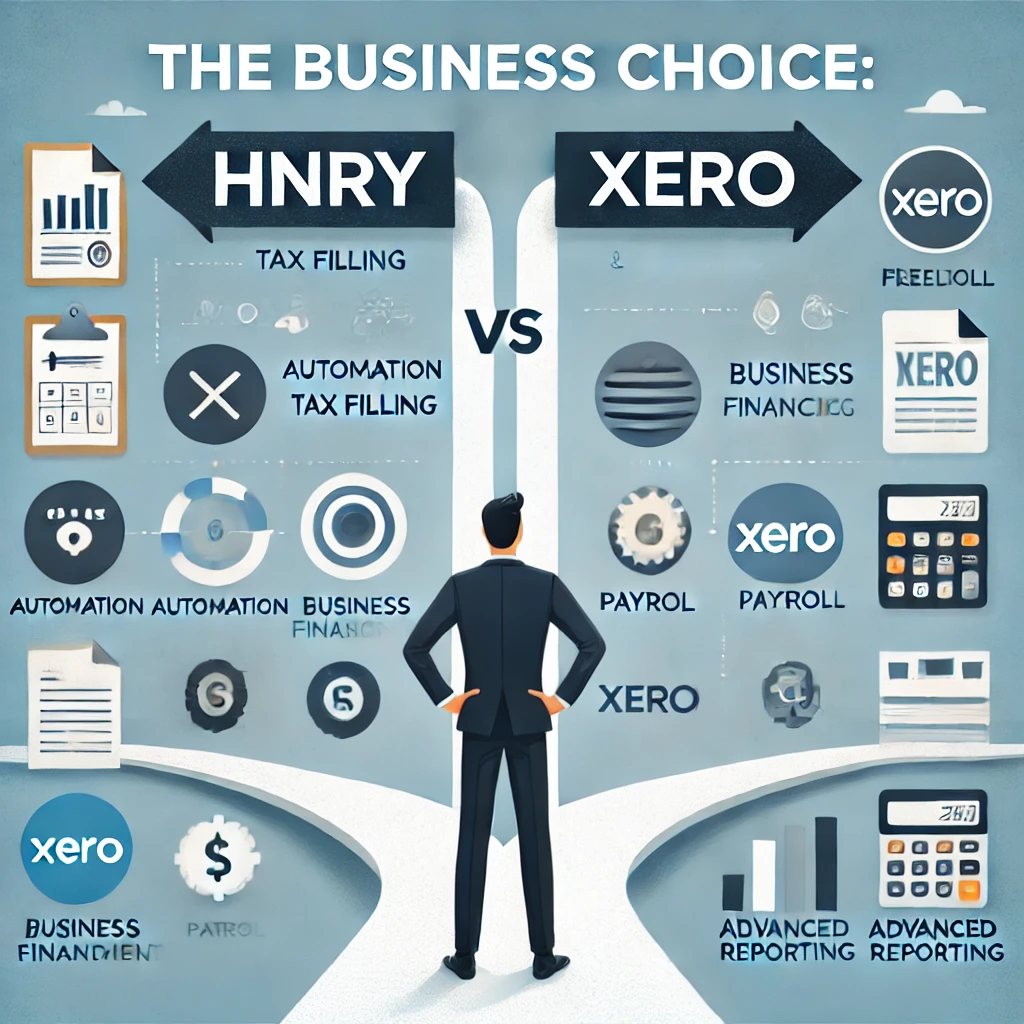Struggling to keep your freelance or small biz finances in check? Picking between hnry and xero isn’t just about software – it’s about finding your financial sidekick. Let’s break down the nitty-gritty differences in tax handling and money management, spotlighting what really sets these platforms apart. Whether you’re flying solo or scaling up, we’ll help you figure out which one clicks with your workflow and actually streamlines your money game.
Hnry vs Xero: Key Differences at a Glance
Picking between Hnry and Xero often comes down to one question: do you want a specialist or a generalist? Hnry acts like your personal accountant for solo ventures, handling expenses and tax filings behind the scenes while you focus on work. Unlike Xero, it automatically sets aside money for bills and submits reports – perfect if you’d rather not stare at spreadsheets all day. Truth is, most freelancers I know just want an app that quietly handles the bookkeeping so they can invoice clients and track payments without hassle.
Now Xero’s different. It’s that robust excel-style system small teams use to automate payroll, manage inventory, and generate financial reports. While it requires more manual input, the upside is customization – you can tweak everything from expense categories to profit projections. But let’s be honest: unless you’re dealing with complex client accounts or multiple income streams, do you really need all those features?
Here’s the kicker: Hnry works best for solopreneurs who want online tools that mirror what accountants do. It’s like having free bookkeeping support baked into your banking app. Xero? That’s for growing businesses ready to graduate from basic spreadsheets. Both handle invoices and reports, but one keeps it simple while the other lets you complicate things endlessly. Your call depends on whether you prefer automation or control.

Hnry vs Xero: Key Differences at a Glance
Let’s break down how these two platforms stack up for different financial needs. Whether you’re tracking expenses or handling invoices, understanding their strengths matters.
| Feature | Hnry | Xero |
|---|---|---|
| Target Audience | Freelancers, Sole Traders, Contractors | Small to Medium-sized Businesses |
| Tax Automation | Automatic calculation and payment | Manual payment/filing unless using add-ons |
| Accounting Tools | Basic expense tracking and invoicing | Full accounting package including bank reconciliation |
| Payroll Management | Not available | Integrated payroll handling |
| Integrations | Works with other apps via Zapier | Extensive integrations with over 700 apps via Zapier and a partner ecosystem |
| Reporting | Essential financial summaries | Customizable detailed reports |
| User Complexity | Simple interface for non-specialists | Better suited with accounting knowledge |
This comparison shows where each platform shines. For independent workers, automated tax handling can be a game-changer – no more late-night excel sheets or missed payments. The system calculates obligations behind the scenes, letting you focus on actual work. Meanwhile, established operations might prefer the detailed reporting and inventory tools found in more robust accounting apps.
Freelancer-Friendly Automation
Hnry takes the headache out of compliance for solo operators. Imagine your expense reports writing themselves while the app handles quarterly filings automatically. It’s particularly handy for those juggling multiple clients – no need to manually track every invoice or calculate withholding taxes. The platform even adapts to different tax scenarios, whether you’re claiming home office costs or industry-specific deductions.
Comprehensive Business Solutions
Xero operates like a digital accountant that never sleeps. From reconciling bank feeds to generating professional invoices, it’s built for growing operations. Real-time cash flow tracking helps prevent overdrafts, while inventory modules keep stock levels visible. For teams needing advanced financial insights, pairing it with a bookkeeping specialist can unlock its full potential.
Here’s what really sets them apart:
- Payroll: Xero handles employee payments seamlessly, while Hnry focuses purely on contractor/self-employed needs
- Multi-Currency: International operations benefit from Xero’s foreign transaction support
- Customization: Xero’s reporting adapts to specific industries, whereas Hnry keeps things standardized
At the end of the day, it comes down to workflow needs. Freelancers wanting to automate financial admin lean toward one solution, while businesses needing detailed bookkeeping tools typically prefer the other. Either way, using proper systems beats trying to track everything through spreadsheets!

Hnry vs Xero: Cost Comparison Breakdown
Let’s break down the pricing models of Hnry and Xero to see which fits different financial situations better. The right choice often comes down to how you handle your bookkeeping and whether you prefer fixed costs or percentage-based fees.
| Pricing Factor | Hnry | Xero |
|---|---|---|
| Fee Structure | 1% + GST of income earned, capped at $1500 + GST per year. Minimum fee of $0.50 for payments under $50. | Monthly subscription plans with fixed fees, regardless of income. |
| Transaction Costs | Included in the percentage fee, except for payments under $50. | Included in the monthly subscription fee. |
| Value Thresholds | Suited for variable incomes; cost scales with earnings. | Potentially more cost-effective for businesses with stable incomes and comprehensive feature needs. |
Here’s the thing: Hnry works like an automated accountant, taking a slice of your income. For freelancers with unpredictable months, that percentage-based model can feel fairer than fixed subscriptions. Say you have a slow quarter—your fees drop accordingly. Xero keeps it simple with monthly plans, which might save money if your earnings stay consistent.
Now, about features… While Xero offers robust excel-style reporting and invoice templates, Hnry handles the nitty-gritty stuff automatically. We’re talking tax payments, expense categorization—the kind of bookkeeping that eats into your time. For solopreneurs, that automation can be worth the fee. But if you’re already comfortable with online accounting tools and need detailed financial reports, Xero’s fixed costs become more appealing.
Pro tip: Many users combine both. They’ll automate tax compliance through Hnry while using Xero’s free trial period to generate custom reports. Either way, the goal’s the same—keeping your expenses tracked and cashflow visible without living in spreadsheets.
Real Users Speak: Hnry vs Xero Experiences
Let’s cut through the marketing fluff. Here’s what actual users report after putting these platforms through their paces – unedited reactions that might surprise you.
- Freelancer using Hnry: “This app basically became my part-time accountant. It handles all my invoices and expense tracking automatically – though I wish it played nicer with my bank’s online portal for smoother reconciliation.”
- Contractor on Hnry: “Weekly pay cycles? Check. Tax sorted? Done. But if you’re married to Excel like me, you’ll still want your spreadsheets for deeper number crunching.”
- Small biz owner on Xero: “Our bookkeeping game changed when we moved online with Xero. The reporting features let me spot cash flow issues faster, though their support team? Good luck reaching a human.”
- Agency using Xero: “Solid for automating expense reports and client billing. Pro tip: pair it with a decent accountant who can navigate the occasional outdated menu.”
Here’s the kicker – both platforms shine in different areas. Hnry users rave about its set-and-forget approach to deductions, perfect if you’d rather focus on work than paperwork. One graphic designer told me, “It’s like having a free financial assistant that never sleeps.”
Xero fans appreciate the detailed financial reports and customization options, though several noted the learning curve. “You’ll want to block out a Saturday to really master the dashboard,” warned a café owner who now swears by its inventory tracking.
The verdict? If you’re solo and hate number-crunching, Hnry’s automated approach could save your sanity. Running a team or need deeper financial insights? Xero’s Excel-like flexibility (minus the formulas) might justify the steeper learning curve. Either way, both beat trying to automate your expenses with a shoebox full of receipts.
Choosing Your Solution: Hnry or Xero?
Picking between Hnry and Xero comes down to two critical factors: how hands-on you want to be with numbers, and where you see your venture heading. Let’s cut through the jargon—if you’re flying solo as a freelancer or contractor, Hnry handles the nitty-gritty like automated deductions like gym membership or marketing expenses and quarterly payments. It’s basically having a digital bookkeeper that stops you from drowning in spreadsheets. Perfect if you’d rather focus on client work than stare at excel sheets all day.
Now Xero? That’s your go-to when receipts pile up faster than unread emails. Designed for growing operations needing proper expense tracking and detailed reports, it lets you automate invoice reminders, reconcile bank feeds, and even generate snappy financial snapshots. Sure, you’ll need to put in some legwork upfront—but once your system’s set up online, those monthly reports practically write themselves. Pro tip: Pair it with a solid accountant (we know a few) and you’ve got a bulletproof setup.
Here’s the kicker: while Hnry keeps things simple today, will it still work if you land bigger contracts next year? That’s where Xero shines. Its online dashboard grows with you, adding inventory management or payroll as needed. Transitioning later isn’t impossible, but why not start right? Either way, ditch the shoebox-of-receipts approach. These apps automate the busywork so you can actually enjoy that cashflow boost. Free bonus? No more Sunday nights wasted on expense reports.
Here’s the deal: picking between Hnry and Xero really comes down to what you’re after. Hnry’s great if you’re self-employed and want taxes sorted without the headache, whereas Xero’s better suited for businesses ready to scale their accounting. Why wait to get your money straight? Figure out which one clicks with your situation now. Honestly, it’s worth it – your stress-free money management starts here.
